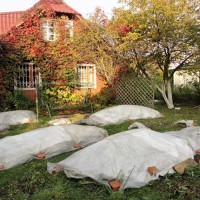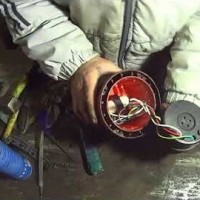The best ways to blow out the water supply system at your dacha for the winter - with and without a compressor
A caring owner will worry in advance about how to bleed the water supply at the dacha for the winter.Wherever the pipes are laid in accordance with the correct slope, water remains in the lower section. This factor can cause problems in the cold due to damage to the pipeline or shut-off and plumbing equipment. In a dacha that is not used in winter, the water supply must be in proper order. It must be blown out before the cold weather.
The content of the article:
Why blow out water pipes before frosts?
According to the law of physics, when freezing, the remaining liquid in the pipes turns into a solid state (freezes) and increases in size. Ice can damage the highest quality plumbing system both internally and externally. That’s why it’s so important to prepare the tool and choose the right way to blow out the water supply system at your dacha before winter in order to remove water from the pipes.

Many country houses are not heated during the winter season, hence the water supply breakdowns that occur in different areas of communications:
- inside the building;
- outside - on street pipe laying;
- on branches to outbuildings;
- near connected equipment - pumps, pumps.
Applications and air purging techniques
You can blow out the water pipes with air supplied by the installation. If the compressor does not have a built-in receiver, select a sealed tank and connect the fittings at the inlet and outlet. You will also need hoses to connect to the pipe.
Regardless of whether or not you plan to move to a city apartment for the winter, in the fall the dacha is prepared for the frosty season. Therefore, it is necessary to blow out the water supply.
Step-by-step procedure:
- Disconnect the water supply from the water supply, close the shut-off element connected to the main line by a pipe. In an off-grid system, the pump is disconnected or disconnected from electricity.
- Drain liquid from all containers in plumbing fixtures, boilers, and toilets. Close shut-off valves.
- Open the far intake valve.
- Connect the storage vessel to the tap via a hose. If a pumping station is used, the compressor is connected to a hydraulic accumulator.
- Start the compressor. In this case, the pressure gauge should show no more than 3 atmospheres, so that the high pressure at the connection points does not damage the water supply.
- Open the tap on the outlet pipe of the receiver.
- Blow out the system (with alternate opening of the taps).
It is possible to effectively blow out a water supply system in a dacha only if all its elements are tightly connected. In the process, you cannot do without adapters, which will provide the structure with water outlet through the pipe without air leakage through the joint.
We recommend reading! Winter water supply from the well: review of the best options and arrangement schemes.
Compressors and their variants
There is no shortage of equipment in stores for summer residents. They sell different types of compressors. But the operating principle of such devices is basically the same.The compressor compresses the air mass, creating pressure in the storage tank. Then the air is supplied under pressure into the main line. The way the air is compressed depends on the design features of the compressor unit.
Piston compressor
If you need to blow out the water supply at your dacha in preparation for winter, a piston model is most often used.
Operating principle of the device:
- the electric motor starts;
- the crankshaft rotates;
- the piston moves down;
- the chamber is in a state of vacuum, free of any substances;
- the cylinder is filled with air through an open valve;
- oxygen is compressed in the container by a piston;
- Through an open channel, compressed air enters the storage tank.
The compressor operates noisily, but with high performance. When the water supply system is cleaned of excess substances in this way for the winter, the pressure gauge readings are monitored and the system is automatically deactivated.
Diaphragm compressor
You can also blow out the pipes with a membrane compressor. Cleaning the water supply system at the dacha before winter is carried out with the additional connection of a receiver with an elastic diaphragm. The engine moves the membrane, changing the volume of air in the chamber. When the diaphragm drops, oxygen enters the compressor reservoir.
With translational movements, the membrane compresses the air mass and expels clean air without lubricants and impurities.

Advantages:
- has smaller dimensions and weight compared to piston;
- easy to maintain and operate;
- low noise level;
- availability of repair kits;
- there are no rubbing parts.
Flaws:
- low operating pressure;
- it is difficult to immediately determine the depressurization of the membrane;
- There are restrictions on temperature differences.
Screw compressor
The easiest way to blow out the water supply system at your dacha is to prepare the system for winter using a screw compressor. Thanks to the continuous air flow pumped by two screws, excess liquid and impurities are completely removed from the system.
This device is less noisy than a piston one, but more productive. That’s why many owners of country houses and summer cottages prefer a screw compressor.

Advantages:
- low vibration and noise;
- there is no need to prepare a foundation site;
- small dimensions and weight;
- pumps clean air without impurities;
- the system is automated - no human control is required;
- resource intensity;
- economical energy consumption;
- To use a screw compressor to blow out the water supply for the winter, you do not need to have special skills.
Scroll compressor
This is a complex modification of compressors, where air masses are driven by a spiral, displacing them into the nozzle. The performance of the device depends on the accuracy of the assembly.
You can blow out the water supply at your dacha for the winter with a similar device, but it also has one significant drawback. If a scroll compressor fails, it can only be repaired in specialized workshops due to the complexity of the design.

Advantages:
- zero dead volume;
- minimal losses;
- minimal heat exchange;
- zero hydraulic losses;
- intake and release are carried out simultaneously.
Disadvantages and advantages of compressors
Cleaning pipes before winter is mandatory. Advantages of using compressors for purging water pipes:
- easy connection.It is necessary to prepare an adapter fitting to connect the outlet hose of the compressor unit to the pipe;
- free movement to the water intake point due to the compactness of the device;
- little noise during operation (except for piston models).
The disadvantage of compressors is the possible contamination of compressed air with lubricants. To avoid this, the receiver is equipped with filters to purify the water supply at the dacha for the winter. Another disadvantage is that many devices have a complex design. Therefore, if they break down, it is impossible to repair them yourself - you have to look for a specialist.
Methods for blowing pipes in a country house without a compressor
It is possible to blow out water pipes at your dacha before winter without expensive compressor devices. But you will have to prepare a storage tank. You need to find a vessel that closes tightly with a lid and can withstand pressure up to about 3 atm. Holes will have to be drilled on the surfaces where the adapters will be attached.
The inlet pipe can be a fitting selected from household supplies. These are found, for example, in tubeless car wheels. The part is inserted into a pre-drilled opening. To seal, treat the connection with sealant.
A threaded fitting with a locking mechanism is installed on the outlet section. Before screwing it on, a tape of fluoroplastic sealing film is applied. It is convenient to shut off the homemade structure with a ball valve. A pressure gauge is placed in the holes in the cover, and the connecting points are sealed.
Sequential order of how to bleed the water supply at the dacha when preparing for winter:
- the inlet fitting of the pipeline is connected to the car pump;
- a section of pipe at the outlet of the storage tank is connected through a tap to the source of liquid;
- air is pumped into the receiver with a pump;
- control the pressure of air masses through a pressure gauge;
- The tap in the storage tank is set to the open position;
- Water is drained from the system by periodically adjusting the locking mechanisms.
In some cases there is no need to blow out pipes
If the water supply system at a dacha in the southern regions is properly installed, it is possible, but not necessary, to purge the system of accumulated water for the winter. The procedure is also not performed in the following situations:
- the region always has warm winters without severe frosts;
- the pipeline is laid deep, where the soil does not freeze;
- the soil serves as thermal insulation, so ice does not form in the pipes even in the cold winter;
- in the building itself the temperature will not drop below zero.
If you need to completely eliminate water from pipes, plumbing experts recommend using compressor units as the most effective means of purging the water supply in your dacha before winter.
Summer residents themselves determine how to clean communication lines before leaving their dacha for the winter. But it is necessary to blow out the water supply to avoid unexpected damage to communications due to freezing of the liquid. It is better to use compressors for this purpose - piston, membrane, spiral, screw.
How do you vent the water supply at your dacha? Share your experience. Save the article to bookmarks and repost on social networks.
We also recommend watching a selection of videos that will reinforce your knowledge and answer any remaining questions.
How to blow water out of the system for the winter with a compressor?
Preparing the water supply system at the dacha for winter.Drain the water from the pumping station and blow out the pipeline.







I have a summer house and I clean out the water supply every year. One time I didn’t do this, because severe frosts hit and the pipes burst. I spent so much effort and money to later restore the entire system. It is more expensive for yourself to skip this procedure.
I was luckier. I live in a warm area where the temperature does not drop below zero. I have never encountered any problem with pipeline blowing.
And yet, it is important to understand that the volume of the pipe must be correlated with the performance of the compressor. For example, one of my friends tried to blow through a pipe with an internal diameter of 90 mm and a length of 400 meters with a household compressor, but was unable to raise the pressure in the pipe even to 1.5 atmospheres in an hour of work.